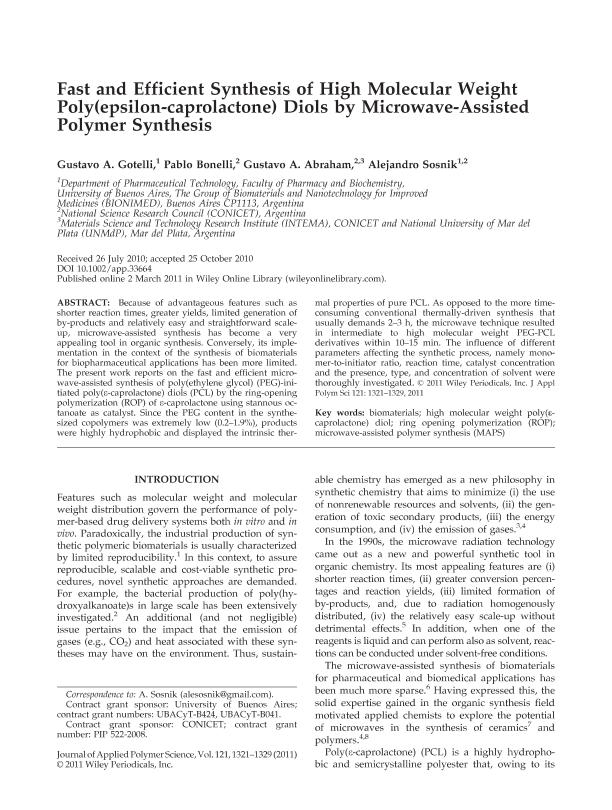Artículo
Fast and efficient synthesis of high molecular weight poly(e-caprolactone) diols by Microwave-Assisted Polymer Synthesis (MAPS)
Fecha de publicación:
08/2011
Editorial:
Wiley
Revista:
Journal Of Applied Polymer Science
ISSN:
0021-8995
Idioma:
Inglés
Tipo de recurso:
Artículo publicado
Clasificación temática:
Resumen
Due to advantageous features such as shorter reaction times, greater yields, limited generation of by-products and relatively easy scale-up without detrimental effects, microwave-assisted synthesis has become a very appealing tool in organic synthesis. On the other hand, its implementation in the context of the synthesis of biomaterials for biopharmaceutical applications has been more limited. The present work reports on the fast and efficient microwave-assisted synthesis of poly(ethylene glycol) (PEG)-initiated poly(epsilon-caprolactone) diols (PCL) by the ring-opening polymerization (ROP) of epsilon-caprolactone using stannous octanoate as the catalyst. Since the PEG content in the synthesized copolymers was extremely low (0.2-1.9%), products were highly hydrophobic and displayed the intrinsic physicochemical and thermal properties of pure PCL. As opposed to the more time–consuming conventional thermally-driven synthesis that usually demands 2-3 h, the microwave technique resulted in high molecular weight PCL derivatives within 10-15 min. The influence of different parameters affecting the synthetic process, namely monomer-to-initiator ratio, reaction time, catalyst concentration and the presence, type and concentration of solvent were thoroughly investigated.
Palabras clave:
Microwave-Assisted Polymer Synthesis
,
Polyesters
,
Biomaterials
Archivos asociados
Licencia
Identificadores
Colecciones
Articulos(INTEMA)
Articulos de INST.DE INV.EN CIENCIA Y TECNOL.MATERIALES (I)
Articulos de INST.DE INV.EN CIENCIA Y TECNOL.MATERIALES (I)
Articulos(OCA CIUDAD UNIVERSITARIA)
Articulos de OFICINA DE COORDINACION ADMINISTRATIVA CIUDAD UNIVERSITARIA
Articulos de OFICINA DE COORDINACION ADMINISTRATIVA CIUDAD UNIVERSITARIA
Citación
Gotelli, Gustavo A.; Bonelli, Pablo Ricardo; Abraham, Gustavo Abel; Sosnik, Alejandro Dario; Fast and efficient synthesis of high molecular weight poly(e-caprolactone) diols by Microwave-Assisted Polymer Synthesis (MAPS); Wiley; Journal Of Applied Polymer Science; 121; 3; 8-2011; 1321-1329
Compartir
Altmétricas




